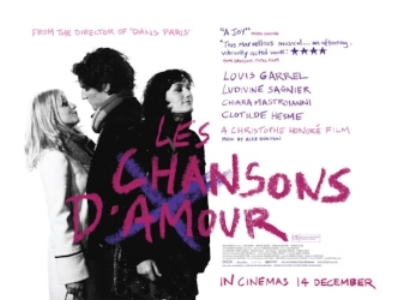Reel to Real: Les Chansons d'Amour
As the title implies, Les Chansons d'Amour is a musical - well, not exactly. It's a film with songs. A full-blown Hollywood musical like Chicago or Hairspray, this is not. Neither is it a revisionist slant on the musical, filled with irony, like Moulin Rouge was. Instead, this harkens back to Jacques Demy's Les Parapluies de Cherbourg and Les Demoiselles du Rochefort (the latter film was one that haunted me throughout childhood - but more on that another time) - in other words, it's a musical that only the French could make, filled with gravitas, an absence of candy-colors and mournful songs.
Divided into three acts, the story begins in 'The Departure' with Julie (Ludvine Saigner), a coquette who is in a relationship with Ismael (director Christophe Honore's muse, Louis Garrel). Though both Julie and Ismael seem relatively content with each other, they've invited Ismael's colleague, Alice (Clotilde Hesme), to join them as a threesome. Alice's role as interloper is the story's catalyst - content to be the balance between Ismael and Julie, she is unable to bridge the chasm between their hearts, and soon, on a visit to Julie's intellectual parents' home, she confides in her sister Jeanne (Chiara Mastroianni) that her love affair might be on the rocks. Ismael himself is aware of the rift between them, but he is unable to articulate what he wants and is content to maintain status quo. One night, Julie suddenly dies of cardiac arrest - or a broken heart, in musical-speak - leaving Ismael bereft, and Alice free.
In 'The Absence', Ismael is unable to cope with his grief and withdraws from Julie's family as well as Alice. Even though Jeanne tries to reach out to him, he rejects her attention, choosing to wallow in his pain and confusion. On her part, Alice dives into another relationship with Gwendal, moving swiftly on from their menage a trois. While hiding out at Gwendal's apartment in an effort to avoid Jeanne who is waiting for him at his own place, Ismael meets Gwendal's younger brother, Erwann (Gregoire LePrince-Ringuet), and a tentative friendship is struck between the two.
Finally, in 'The Return', Ismael begins to emerge from his shell. Alice, now estranged from Gwendal, spies Erwann near the office and mistakes that he has come to stalk her on his brother's behalf. Unknown to her, the young man has become besotted with Ismael, much to the latter's bemusement and curiosity. Unable to make peace with Ismael, Jeanne is forced to come to terms with her grief alone, while a renewed Ismael makes peace with the ghost of Julie, and finally succumbs to Erwann's persistence and falls in love again.
Woven throughout this narrative of progressive mores, fluid sexuality and the mysteries of the human heart are 13 songs by singer-songwriter Alex Beaupain, Mr Honore's long-time musical collaborator, all of which are pretty, if somewhat slight. There are a few memorable tunes, lots of wickedly funny, double-entendre-laden lyrics, and they are all sung in character by the actors in beautifully modulated performances.
A common criticism of this film has been its lack of narrative drive. This is largely due to the fact that Ismael, the protagonist, is a reactor to what happens around him. Mr Garrel, working on his third Honore project in a row, looks like a male model; with his roman nose, tousled hair and bedroom eyes, he makes Ismael's self-absorption and petulance easy to believe, but when it comes to the thawing of his heart, his approach to the character keeps Ismael’s feelings far at bay. As Jeanne, Ms Mastroianni - daughter of Marcello Mastroianni and Jacques Demy's musical muse, Catherine Deneuve - imbues her character with a solid core of grief that grounds her in reality. Her delivery of her solo number, Au Parc, is a beautifully rendered bit of musical acting. With little to do, Ms Saigner nonetheless makes an impression, and Ms Hesme's freewheeling characterization of Alice makes her the movie's most amusing voice. However, Mr Honore's sympathies lie with the men in the story, and whereas he asks for our indulgence of Mr Garrel's uneven performance, he also delivers to us Mr LePrince-Ringuet, who hits all his marks. It's been a few years since his award-nominated debut in Andre Techine's Les Egares as a pre-teen, but Mr LePrince-Ringuet has matured into a fine actor. Personifying innocent naivete and amour fou is a tall order, but he not only manages to make Erwann beguiling, he also humanizes the character, showing the audience his youthful wisdom in matters of the heart. Though he's not onscreen much, his is the performance that makes the most lasting impression.
As an author, playwright and now filmmaker, Mr Honore traffics more in ideas than he does in reality, as is evident by the film’s unrealistic narrative. However, the combination of comedy (yes, there are actually quite a lot of laughs in this story of broken hearts), drama and music are perfectly balanced, and from start to finish, the film unexpectedly works.

